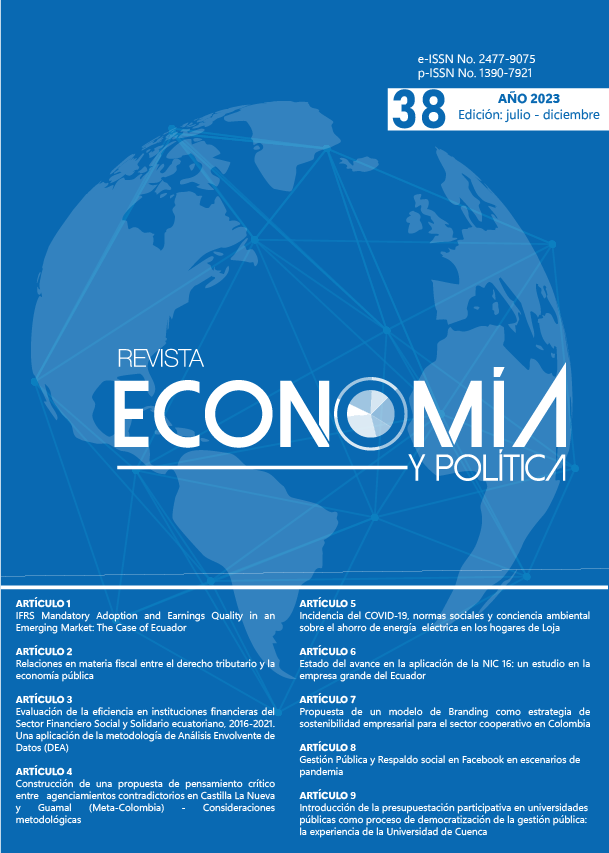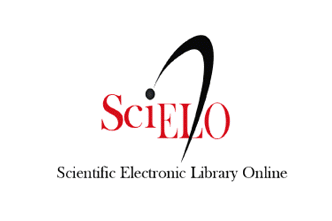Incidencia del COVID-19, normas sociales y conciencia ambiental sobre el ahorro de energía eléctrica en los hogares de Loja
DOI:
https://doi.org/10.25097/rep.n38.2023.05Palabras clave:
Pandemia., Comportamiento ambiental., Conmoción social., Ecuaciones estructurales., COVID-19.Resumen
Las medidas para mitigar el contagio de la enfermedad del coronavirus 2019 (COVID-19) generaron modificación en el comportamiento humano. En este contexto, el objetivo de la siguiente investigación es examinar la incidencia que tuvo el COVID-19 sobre el ahorro de energía eléctrica en los hogares de la ciudad de Loja durante la pandemia. Para lo cual, se realizó una encuesta, la misma que fue aplicada a 387 hogares de la ciudad para conocer el comportamiento ambiental que mantuvieron durante la pandemia. Posteriormente, se procesó la información mediante un modelo de ecuaciones estructurales por mínimos cuadrados parciales (PLS-SEM, por sus siglas en inglés). Se validó el modelo de medida y estructural para verificar la consistencia de los resultados e hipótesis de estudio. Los resultados encontrados revelan que la COVID-19 está relacionada de forma negativa con el ahorro de energía eléctrica, es decir, no aumentó el ahorro de energía eléctrica, por el contrario, este disminuyó. Adicionalmente, otros factores, asociados a la conciencia ambiental y las normas sociales, inciden en el ahorro de energía eléctrica. De los resultados encontrados se derivan algunas implicaciones de política orientadas a mejorar las prácticas ambientales de ahorro de energía eléctrica para impulsar la sostenibilidad ambiental.
Descargas
Citas
Abdeen, A., Kharvari, F., O'Brien, W., y Gunay, B. (2021). The impact of the COVID-19 on households’ hourly electricity consumption in Canada. Energy and Buildings, 250 doi:10.1016/j.enbuild.2021.111280
Abu-Rayash, A., y Dincer, I. (2020). Analysis of the electricity demand trends amidst the COVID-19 coronavirus pandemic. Energy Research & Social Science, 68, 101682.
Ajzen, I., y Madden, T. J. (1986). Prediction of goal-directed behavior: Attitudes, intentions, and perceived behavioral control. Journal of experimental social psychology, 22(5), 453-474.
Bagozzi, R. P., Yi, Y., y Phillips L. W. (1991). Assessing construct validity in organizational research. Administrative science quarterly: 421-458.
Biel, A., y Thøgersen, J. (2007). Activation of social norms in social dilemmas: A review of the evidence and reflections on the implications for environmental behaviour. Journal of economic psychology, 28(1), 93-112.
Boomsma, C., Jones, R. V., Pahl, S., y Fuertes, A. (2019). Do psychological factors relate to energy saving behaviours in inefficient and damp homes? A study among English social housing residents. Energy Research & Social Science, 47, 146-155.
Boto-García, D., y Bucciol, A. (2020). Climate change: Personal responsibility and energy saving. Ecological Economics, 169, 106530.
Carmines, E. G., y Zeller, R. A. (1979). Reliability and validity assessment. Sage publications
Carvajal, F., Chueca, E. y Hallack, M. (2021). Las cifras que marcaron el ritmo de la matriz energética de la región durante el COVID-19. Banco Interamericano de Desarrollo https://blogs.iadb.org/energia/es/las-cifras-que-marcaron-el-ritmo-de-la-matriz-energetica-de-la-region-durante-el-covid-19/
Chen, C. F., Nelson, H., Xu, X., Bonilla, G., y Jones, N. (2021). Beyond technology adoption: Examining home energy management systems, energy burdens and climate change perceptions during COVID-19 pandemic. Renewable and Sustainable Energy Reviews, 145, 111066.
Chen, M. F. (2016). Extending the theory of planned behavior model to explain people's energy savings and carbon reduction behavioral intentions to mitigate climate change in Taiwan–moral obligation matters. Journal of Cleaner Production, 112, 1746-1753.
Chen, X., y Gou, Z. (2022). Bridging the knowledge gap between energy-saving intentions and behaviours of young people in residential buildings. Journal of Building Engineering, 57, 104932.
Chin, W. W. (1998). The partial least squares approach to structural equation modeling. Modern methods for business research, 295(2), 295-336.
Choi, S., y Yoon, S. (2023). Energy signature-based clustering using open data for urban building energy analysis toward carbon neutrality: A case study on electricity change under COVID-19. Sustainable Cities and Society, 92 doi:10.1016/j.scs.2023.104471
Cristancho Triana, G. J. (2023). Actitud e intención hacia el consumo responsable en los hogares de Bogotá. Tendencias, 24(1), 130-154.
Daryanto, A., Song, Z., y Soopramanien, D. (2022). The COVID-19 pandemic as an impetus for pro-environmental behaviours: The role of causal attribution. Personality and Individual Differences, 187, 111415.
Ding, Y., Ivanko, D., Cao, G., Brattebø, H., y Nord, N. (2021). Analysis of electricity use and economic impacts for buildings with electric heating under lockdown conditions: Examples for educational buildings and residential buildings in norway. Sustainable Cities and Society, 74 doi:10.1016/j.scs.2021.103253
Ek, K., y Söderholm, P. (2010). The devil is in the details: Household electricity saving behavior and the role of information. Energy Policy, 38(3), 1578-1587.consumo
Evensen, D., Whitmarsh, L., Bartie, P., Devine-Wright, P., Dickie, J., Varley, A., Ryder, S., y Mayer, A. (2021). Effect of “finite pool of worry” and COVID-19 on UK climate change perceptions. Proceedings of the National Academy of Sciences, 118(3), e2018936118.
Fornell, C. y Larcker, D. F. (1981). Evaluating Structural Equation Models with Unobservable Variables and Measurement Error. Journal of Marketing Research, 18(1), 39-50. https://www.jstor.org/stable/3151312
Fu, W., Zhou, Y., Li, L., y Yang, R. (2021). Understanding household electricity-saving behavior: Exploring the effects of perception and cognition factors. Sustainable Production and Consumption, 28, 116-128.
Gefen, D., Straub, D., Boudreau, M.-C., Gefen, D. y Straub, D. (2000). Structural Equation Modeling and Regression: Guidelines for Research Practice. Communications of the Association for Information Systems, 4. https://doi.org/10.17705/1CAIS.00407
Gobierno Autónomo Descentralizado de Loja (2021, 1 de noviembre). Consumo de electricidad residencial de la ciudad de Loja. https://www.loja.gob.ec/
Gobierno Autónomo Descentralizado de Loja (2023, 10 de mayo). Ubicación Geográfica de la ciudad. https://www.loja.gob.ec/
Hair, J. F., Ringle, C. M., y Sarstedt, M. (2013). Partial least squares structural equation modeling: Rigorous applications, better results and higher acceptance. Long range planning, 46(1-2), 1-12.
He, R., Jin, J., Qiu, X., Zhang, C., y Yan, J. (2023). Rural residents' climate change perceptions, personal experiences, and purchase intention–behavior gap in energy-saving refrigeration appliances in Southwest China. Environmental Impact Assessment Review, 98, 106967.
Hori, S., Kondo, K., Nogata, D., y Ben, H. (2013). The determinants of household energy-saving behavior: Survey and comparison in five major Asian cities. Energy Policy, 52, 354-362.
Hu, L. T., y Bentler, P. M. (1999). Cutoff criteria for fit indexes in covariance structure analysis: Conventional criteria versus new alternatives. Structural equation modeling: a multidisciplinary journal, 6(1), 1-55.
Huang, Z., y Gou, Z. (2022). Electricity consumption variation of public buildings in response to COVID-19 restriction and easing policies: A case study in scotland, U.K. Energy and Buildings, 267 doi:10.1016/j.enbuild.2022.112149
Kang, H., An, J., Kim, H., Ji, C., Hong, T., y Lee, S. (2021). Changes in energy consumption according to building use type under COVID-19 pandemic in South Korea. Renewable and Sustainable Energy Reviews, 148 doi:10.1016/j.rser.2021.111294
Karki, S., y Mix, T. L. (2022). Social control in women’s pursuit of secondary education in Kathmandu, Nepal:‘if I can’t sign my name, I can’t maintain my privacy.’. Journal of Gender Studies, 31(4), 413-426.
Khalil, M. A., y Fatmi, M. R. (2022). How residential energy consumption has changed due to COVID-19 pandemic? An agent-based model. Sustainable Cities and Society, 81, 103832.
Koop, S. H. A., Van Dorssen, A. J., y Brouwer, S. (2019). Enhancing domestic water conservation behaviour: A review of empirical studies on influencing tactics. Journal of environmental management, 247, 867-876.
Krarti, M., y Aldubyan, M. (2021). Review analysis of COVID-19 impact on electricity demand for residential buildings. Renewable and Sustainable Energy Reviews, 143, 110888.
Kumar, P., Caggiano, H., Shwom, R., Felder, F. A., y Andrews, C. J. (2023). Saving from home! How income, efficiency, and curtailment behaviors shape energy consumption dynamics in US households? Energy, 126988.
Likert, R. (1932). A technique for the measurement of attitudes. Archives of psychology.
Long, R., Wang, J., Chen, H., Li, Q., Wu, M., y Tan-Soo, J. S. (2023). Applying multilevel structural equation modeling to energy-saving behavior: The interaction of individual-and city-level factors. Energy Policy, 174, 113423.
López-Sosa, L. B., Alvarado-Flores, J. J., Marín-Aguilar, T. N. J., Corral-Huacuz, J. C., Aguilera-Mandujano, A., Rodríguez-Torres, G. M., Morales-Máximo, M., Rodríguez-Magallón, M., Alcaraz-Vera, J. V., Ávalos-Rodríguez, M. L., Rutiaga-Quiñones, J. G., Rodríguez-Olalde, N. E., Flores-Armenta, M., y García, C. A. (2021). COVID-19 pandemic effect on energy consumption in state universities: Michoacan, mexico case study. Energies, 14(22) doi:10.3390/en14227642
Ma, A. T., Wong, G. K., Cheung, L. T., Lo, A. Y., y Jim, C. Y. (2021). Climate change perception and adaptation of residents in Hong Kong. Journal of Cleaner Production, 288, 125123.
Matiiuk, Y., Krikštolaitis, R., y Liobikienė, G. (2023). The Covid-19 pandemic in context of climate change perception and resource-saving behavior in the European Union countries. Journal of Cleaner Production, 395. 136433, ISSN 0959-6526, https://doi.org/10.1016/j.jclepro.2023.136433.
Ministerio de Energía y Minas (2020). Durante emergencia sanitaria, la demanda de energía eléctrica disminuyó en más del 10% en el Ecuador. Recuperado de: https://www.recursosyenergia.gob.ec/durante-emergencia-sanitaria-la-demanda-energia-electrica-disminuyo-en-mas-del-10-en-el-ecuador/
Mustapa, S. I., Rasiah, R., Jaaffar, A. H., Bakar, A. A., y Kaman, Z. K. (2021). Implications of COVID-19 pandemic for energy-use and energy saving household electrical appliances consumption behaviour in Malaysia, Energy Strategy Reviews, 38. 100765, ISSN 2211-467X, https://doi.org/10.1016/j.esr.2021.100765.
Nasir, S. N. S., Ludin, N. A., Radzi, A. A. S. M., Junedi, M. M., Ramli, N., Marsan, A., Mohd, Z. F. A., Roslan, M. R., y Taip, Z. A. (2022). Lockdown impact on energy consumption in university building. Environment, Development and Sustainability, doi:10.1007/s10668-022-02507-z
Norouzi, N., Zarazua de Rubens, G., Choubanpishehzafar, S., y Enevoldsen, P. (2020). When pandemics impact economies and climate change: Exploring the impacts of COVID-19 on oil and electricity demand in china. Energy Research and Social Science, 68 doi:10.1016/j.erss.2020.101654
Operador Nacional de Electricidad – CENACE (2020). Demanda de energía eléctrica del Ecuador se recupera. Recuperado de: http://www.cenace.gob.ec/demanda-de-energia-electrica-del-ecuador-se-recupera/
Ortega-Vivanco, M. (2020). Efectos del Covid-19 en el comportamiento del consumidor: Caso Ecuador. RETOS. Revista de Ciencias de la Administración y Economía, 10(20), 233-247.
Prete, M., Piper, L., Rizzo, C., Pino, G., Capestro, M., Mileti, A., Pichierri, M., Amatulli, C., Peluso, A., & Guido, G. (2017). Determinants of Southern Italian households' intention to adopt energy efficiency measures in residential buildings. Journal of Cleaner Production, 15 (2017), pp. 83-91.
Quaglione, D., Cassetta, E., Crociata, A., y Sarra, A. (2017). Exploring additional determinants of energy-saving behaviour: The influence of individuals' participation in cultural activities. Energy Policy, 108, 503-511.nces consumption behaviour in Malaysia. Energy Strategy Reviews, 38, 100765.
Ru, X., Wang, S., y Yan, S. (2018). Exploring the effects of normative factors and perceived behavioral control on individual’s energy-saving intention: An empirical study in eastern China. Resources, Conservation and Recycling, 134, 91-99.
Surahman, U., Hartono, D., Setyowati, E., y Jurizat, A. (2022). Investigation on household energy consumption of urban residential buildings in major cities of indonesia during COVID-19 pandemic. Energy and Buildings, 261 doi:10.1016/j.enbuild.2022.111956
Tavakoli, S., Loengbudnark, W., Eklund, M., Voinov, A., y Khalilpour, K. (2023). Impact of COVID-19 pandemic on energy consumption in office buildings: A case study of an australian university campus. Sustainability (Switzerland), 15(5) doi:10.3390/su15054240
Tawalbeh, N. A., Al Mattar, S. S., Abu Elhaija, W. S., y Khasawneh, M. A. (2021). Impact of COVID-19 on electric energy consumption. Paper presented at the 2021 12th International Renewable Energy Congress, IREC 2021, doi:10.1109/IREC52758.2021.9624928
Trotta, G. (2018). Factors affecting energy-saving behaviours and energy efficiency investments in British households. Energy policy, 114, 529-539.
Vasseur, V., Marique, A. F., y Udalov, V. (2019). A conceptual framework to understand households’ energy consumption. Energies, 12(22), 4250.
Wang, B., Wang, X., Guo, D., Zhang, B., y Wang, Z. (2018). Analysis of factors influencing residents’ habitual energy-saving behaviour based on NAM and TPB models: Egoism or altruism? Energy policy, 116, 68-77.
Xu, S., Cheng, B., Huang, Z., Liu, T., Li, Y., Jiang, L., Gou, W., y Xiong, J. (2023). Impact of the COVID-19 on electricity consumption of open university campus buildings – the case of twente university in the netherlands. Energy and Buildings, 279 doi:10.1016/j.enbuild.2022.112723
Yuriev, A., Dahmen, M., Paillé, P., Boiral, O., y Guillaumie, L. (2020). Pro-environmental behaviors through the lens of the theory of planned behavior: A scoping review. Resources, Conservation and Recycling, 155, 104660.
Zhao, X., Cheng, H., Zhao, H., Jiang, L., y Xue, B. (2019). Survey on the households’ energy-saving behaviors and influencing factors in the rural loess hilly region of China. Journal of cleaner production, 230, 547-556.
Publicado
Cómo citar
Número
Sección
Licencia
Derechos de autor 2023 Revista Economía y Política

Esta obra está bajo una licencia internacional Creative Commons Atribución-NoComercial-CompartirIgual 4.0.






